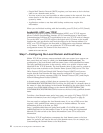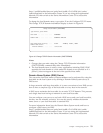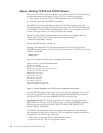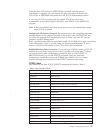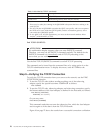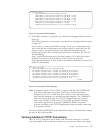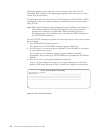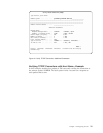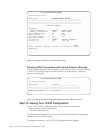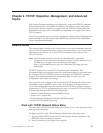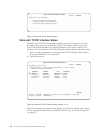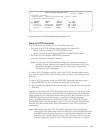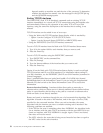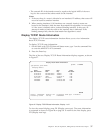
Verifying TCP/IP Connections with Internet Address—Example
In this example, (Figure 22) the connection to the remote system at Internet address
9.4.191.76 is verified using the system defaults for packet length, number of
packets, and wait time.
Step 10—Saving Your TCP/IP Configuration
To save your TCP/IP configuration files, use the following command:
SAVOBJ OBJ(QATOC* QATM*) LIB(QUSRSYS)
DEV(TAP01) OBJTYPE(*FILE)
The associated line descriptions are not saved with this command. Configuration
objects are saved with the system.
To maintain consistency, save all TCP/IP configuration files together.
Verify TCP/IP Connection (PING)
Type choices, press Enter.
Remote system .........>SYSNAM36.SYSNAM123.IBM.COM_____________
_______________________________________________________________________________
_______________________________________________________________________________
_______________________________________________________________________________
Additional Parameters
Message mode:
Response message detail . . . *VERBOSE *VERBOSE, *QUIET
Summary, if response errors . *COMP *COMP, *ESCAPE
Packet length (in bytes).... 256 8-512
Number of packets ....... 5 1-999
Wait time (in seconds)..... 1 1-120
Local internet address..... *ANY________
Type of service ........ *NORMAL *MINDELAY, *MAXTHRPUT...
IP time to live ........ *DFT 1-255, *DFT
More...
F3=Exit F4=Prompt F5=Refresh F12=Cancel F13=How to use this display
F24=More keys
Figure 22. Verifying Connection to Remote System SYS1
Verify TCP/IP Connection (PING)
Type choices, press Enter.
Remote system ......... *intnetadr___________________________
_______________________________________________________________________________
_______________________________________________________________________________
_______________________________________________________________________________
Remote internet address ....>'9.4.191.76'
Figure 23. Verifying Connection to Remote System at Internet Address 9.4.191.76
30 OS/400 TCP/IP Configuration and Reference V5R1



